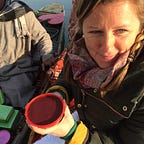Back on air
WFP helps restore community radios that saved lives in Mozambique after cyclone Idai
In the hours before Cyclone Idai struck central Mozambique, community radio stations helped prepare people for impending disaster. Now, the Emergency Telecommunications Cluster (ETC) — a global network of humanitarian, government and private sector organizations led by the World Food Programme (WFP) — has rehabilitated six radio stations. Nine months on, backed by the United Nations Central Emergency Response Fund (CERF), they’re back on the air, stronger than ever.
A baby born in a mango tree. A fisherman who swam through the floods. A hopeful sister looking for her brothers. A young mother left a widow at the age of 23. Another who gripped her children, entangled in branches as water engulfed them. Two children buried alive under the house they lived in.
These are just fragments — raw and jagged — of extraordinary stories that have become woven into the fabric of Mozambique’s history. It’s been nine months since Cyclone Idai unleashed its fury and many of those who survived did so because of warnings and advice that were broadcast on community radio stations.
“Move to higher ground.” “Keep your whole family together.” “Keep your phones charged and dry.”
Community radios in Sofala province, in Beira, Dondo, Aguia, Buzi and Nhamatanda all received warnings — some from local government authorities, some from friends at a local sugar company — the day before the cyclone made landfall. Warnings were broadcast every hour for 36 hours with presenters advising people on how to prepare for the disaster and protect themselves and their families in the limited time they had. ‘Keep food stocks dry.’ ‘Put documents in plastic bags and keep safe.’ ‘Move to higher ground.’ ‘Keep your whole family together.’ Stay away from trees and cables.’ ‘Secure the roof.’ ‘Remain indoors.’ ‘Keep your phones charged and dry.’
Crucially, people listened and acted accordingly. Sitting in his tiny office in humid Nhamatanda, the president of the municipal council spoke quietly about the importance of communication: “The radio [Radio Nhamatanda] was very important. Whoever had a radio listened to it and the warnings saved lives, and many of them.”
These radio stations, often housed in tiny, unassuming buildings, continued to broadcast warning messages until the power was cut and everything went black. One Radio Nhamatanda presenter, Rodrigues, risked his life to save the valuable equipment as he knew communication would be vital in the days and weeks that followed. He unplugged what he could and slept out the storm on the floor of the studio. His own home — built in the traditional Mozambican way with mud and bricks and thatched with grass — was destroyed that night.
Community radio remained a vital tool in the immediate aftermath of the cyclone, too, as people sought and shared information. Sometimes the news was miraculous: one desperate caller searching for her husband — who had half-swum, half-floated for hours through the floods — was reunited with him. More often the news was heartbreaking: a young woman walked eight kilometres to her family home in Lamego as there were no mobile phones, no radio and found two children had been crushed under the collapse of their own house. Another’s husband was swept into the swelling Pungue river as she sheltered her two young children with her body. “We heard warnings to leave the river [where I lived] and I heard a rushing noise but thought it was the wind,” said another, who is now entirely alone.
Having been moved to a temporary camp along the dusty main road in Nhamatanda, they waited for news of loved ones and to hear when, if ever, they can go home or at least to the place home once was. Through the air, a TV show could be heard; the owner of a house on the edge of the camp had turned it up for everyone to hear. In the absence of radio, which was the centre of community life — a fountain of news, entertainment and education — it brought some light relief.
Tuning back in
Today, more than 1.9 million listeners are able to tune into their favourite radio stations in Sofala province once again. In November, the WFP-led Emergency Telecommunications Cluster (ETC), together with the National Forum of Community Radios (Forum Nacional de Rádios Comunitárias — FORCOM), and the UN’s Central Emergency Research Fund (CERF), completed the rehabilitation of six stations with new communications towers, transmitters, speakers and microphones. What has happened over the last eight months cannot be erased, but people can be better prepared for the next disaster by having access to information. And this is where community radios are a very literal lifeline.
Standing in the rubble of what once was Radio Nhamatanda a few weeks after Cyclone Idai struck, one presenter explained how — in the absence of any public counselling or mental health services — he tried to help people through the airwaves: “I tell them: have hope, do something, don’t give up, let’s rebuild and move forward.”
Nine months on in this small corner of Mozambique, the community is doing just that.
